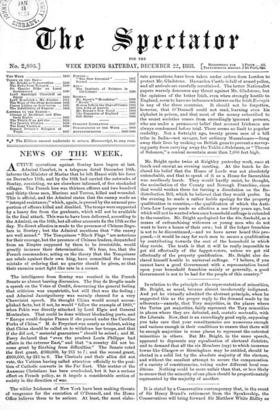In relation to the principle of the representation of minorities,
Mr. Bright, as usual, became almost incoherently indignant. And yet he virtually admitted the abstract principle, when he suggested this as the proper reply to the demand made by its adherents—namely, that Tory majorities, in the places where the Tories get majorities, fairly represent the Tory minorities in places where they are defeated, and, mutatis mutandis, with the Liberals. Now, that is an exceedingly good reply, supposing you take care that your constituencies are numerous enough and various enough in their conditions to ensure that there will be enough majorities in some places to represent the outvoted minorities in others. But Mr. Bright, in the same speech,. appeared to deprecate any equalisation of electoral districts, and to demand that all the six Members (say) to which immense towns like Glasgow or Birmingham may be entitled, should be elected in a solid list by the absolute majority of the electors, and without the smallest attempt to secure the compensation of a variety of constituencies, voting under different local con- ditions. Nothing could be more unfair than that, or less likely to secure that the minority of one place should be proportionately represented by the majority of another.






































